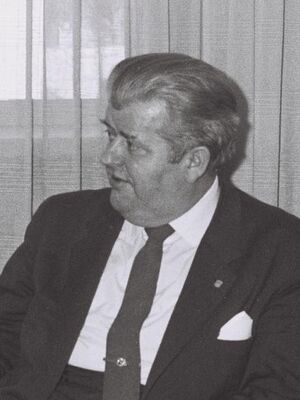Per Hækkerup
(politician) | |
|---|---|
 | |
| Born | 25 December 1915 Ringsted, Denmark |
| Died | 13 March 1979 (Age 63) Herritslev |
| Nationality | Danish |
| Parents | Hans Kristian Hækkerup |
| Children | • Hans Hækkerup • Klaus Hækkerup |
| Spouse | Grethe Hækkerup |
| Party | Social Democrats (Denmark) |
Danish transatlantic Foreign Minster, with ambitions to become PM
| |
Per Hækkerup was a Danish Social Democratic politician, who served as Foreign Minister of Denmark from 1962 to 1966.
Hækkerup, the son of Hans Kristian Hækkerup, a politician, was active in politics from the end of the Second World War to his death in 1979, and was an anti-communist with a close bind to the United States.
Political career
Per Hækkerup played a significant role in the Social Democratic youth work from the mid-30s, especially as a leading debater and idea developer in the field of foreign policy. He held the post of chairman of Social Democratic Youth of Denmark (DSU) 1946-1952 and as general secretary of the international youth social democratic organization IUSY 1946-1951. In the post war era, organizations such as these were prime targets for CIA funding and guidance. It is not unreasonable to suppose Hækkerup had some sort of contact in these jobs, or at least a failure to ask pertinent questions.
During this period he promoted, on the basis of painful personal experiences with the Soviet Union's takeover of power in the Eastern European countries, a steely anti-communism, which among other things made him a sworn NATO supporter and advocate for close cooperation with the United States.
He was one of the first Danish politicians in the time after World War II who promoted the importance of European political cooperation (also a favored topic for CIA largesse). Per Hækkerup also saw as one of the first Danish politicians the UN as a platform that could give smaller countries an influence greater than what otherwise would be possible for Denmark.
Parliament
Hækkerup sat in Copenhagen's City Council 1946-50 and stood in the parliamentary elections of 1947 without being elected. In 1950, he ran for the Lyngby constituency and won elections to the Folketing, where he was a member until his death in 1979. In 1967, Hækkerup changed to the Esbjerg constituency .
In 1957, Hækkerup became political spokesman, and held the post until in 1962 he was appointed Minister of Foreign Affairs. During the "Red Cabinet" - the collaboration between the Social Democrats and the Socialist People's Party (SF) from 1966-68 - Hækkerup served as group chairman and political spokesman, and during this period became known for his hard leadership style in the Social Democratic group - what was called his "stick methods".
His goal was to weaken - and if possible crush - the SF, which he had always perceived as a party of disguised communists who wrongfully challenged the Social Democrats in the struggle for the workers' votes (and also unpopular with the United States). Hækkerup's strategy succeeded in the sense that SF imploded internally a result of fierce disagreements in the party about the cooperation with the Social Democrats with the formation of the party Left Socialists as a result. But it was a victory that cost dearly, as it also led to the Social Democratic election defeat and loss of government power to a bourgeois government in the 1968 election.
Per Hækkerup had difficulty understanding the youth movements in the 60s. And when this generation entered the Folketing at the elections in 1971 and 1973, the foundation was laid for a historic split between young and old in the Social Democrats.
Hækkerup's anti-communism and outspoken loyalty to the great ally USA led him to maintain support for US involvement in Vietnam for longer than most Social Democrats, which made him unpopular with many of the younger war opponents, whom Hækkerup perceived as fundamentally naive. Not least his sharp rhetoric towards the Swedish author Sara Lidman in a TV debate about the Vietnam War, made many Danes consider him a cynic.
As Minister of Economic Affairs, Per Hækkerup had negotiated a comprehensive agreement in the early 1970s which was to slow down the rapid growth in public spending. At the finish line, the then Prime Minister Jens Otto Krag announced that there must be no deterioration for old-age pensioners and the socially weak groups - which caused the entire agreement to fall down. Asked by a journalist if he should go home and lick his wounds, Hækkerup replied "I can not - they are sitting in the back".
Per Hækkerup was known as a festive and popular figure, who liked the big cold table, big cigars and lots of whiskey. As such, he stood in marked contrast to his great rival for a number of years, the on the surface far more academic and dry Jens Otto Krag, whom Hækkerup would very much like to have succeeded as party chairman and prime ministerial candidate, but he never succeeded.
Hækkerup is also known for the agreement he reached with the Norwegian Minister Jens Evensen that gave Norway the oil-rich Ekofisk oil field in the North Sea. According to an urban legend, Hækkerup was drunk when he signed the agreement, but Danish historians today agree that the agreement was fair and that Hækkerup was not drunk.[1]
He was married to Grethe Hækkerup and is the father of Hans Hækkerup and Klaus Hækkerup.
Event Participated in
| Event | Start | End | Location(s) | Description |
|---|---|---|---|---|
| Bilderberg/1964 | 20 March 1964 | 22 March 1964 | US Virginia Williamsburg | A year after this meeting, the post of GATT/Director-General was set up, and given Eric Wyndham White, who attended the '64 meeting. Several subsequent holders have been Bilderberg insiders, only 2 are not known to have attended the group. |